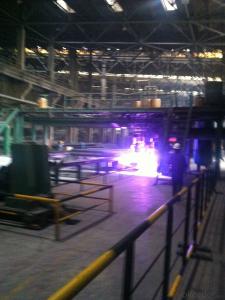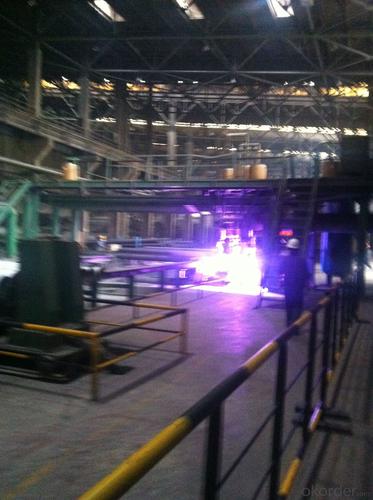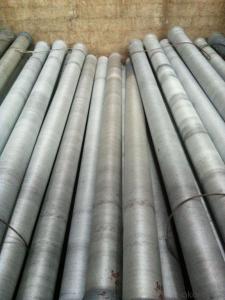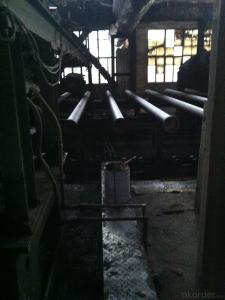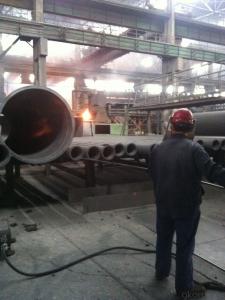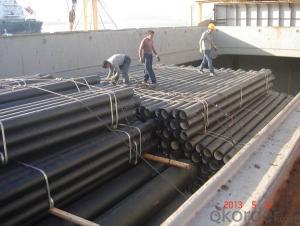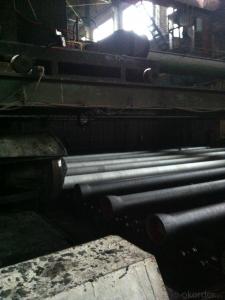DUCTILE IRON PIPES AND PIPE FITTINGS K7 CLASS DN900
- Loading Port:
- Tianjin
- Payment Terms:
- TT OR LC
- Min Order Qty:
- 22 pc
- Supply Capability:
- 3000 pc/month
OKorder Service Pledge
OKorder Financial Service
You Might Also Like
Material : Ductile Cast Iron
Size Range : DN 80mm to DN 2000mm
Unit Effective Length : 6m or 5.7m
Manufacture Standard: ISO 2531:1998/ EN 545:2006/EN 598:2007
Annual capacity : 200,000 tons
Coating Exterior: Zinc 130g/m2 according to ISO 8179-1 and bitumen coating 70 microns.
Cement Interior: Portland Cement/ High Alumina Cement/ Sulphate Resisting Cement Lining according to ISO 4179
Special requirements on external coating and internal lining can be applied
We also provide accessories such as SBR/EPDM rubber gaskets, lubricant paste, pipe caps, PE sleeves, etc.
Additional Parts:
Each pipe is strictly inspected according to related standard to ensure permanently high performance.
Easy Installation at site and service free for life
Long Service Lifespan
Quotation will arrive you within 24hours once we get your inquiry.
We guarantee offering you a competitive price.
A copy of original inspection reports of pipes will be offered after shipment.
Photos of loading process will be sent to the customer after shipment effect.
We will follow-up the delivery progress after shipment effect and update to the customer on weekly basis.
- Q: Are ductile iron pipes suitable for use in chemical storage tanks?
- No, ductile iron pipes are not suitable for use in chemical storage tanks.
- Q: What is cast iron pipe, specification for cast iron pipe?
- According to the different casting methods, the labor intensity is divided into continuous cast iron pipes and centrifugal cast iron pipes, in which the centrifugal cast iron pipes are divided into two kinds: sand mould and metal mould. Divided into gray cast iron pipe and nodular cast iron pipe according to different material. Rubber ring seals for flexible interfaces,
- Q: Can ductile iron pipe be used for sewer and wastewater systems?
- Yes, ductile iron pipe can be used for sewer and wastewater systems. Ductile iron is a strong and durable material that can withstand the harsh conditions of sewage and wastewater transport. It has excellent corrosion resistance and can handle high-pressure environments, making it a suitable choice for these applications.
- Q: Can ductile iron pipes be used for water main extensions?
- Yes, ductile iron pipes can be used for water main extensions. Ductile iron pipes have excellent strength and durability, making them suitable for carrying water over long distances and withstanding high pressure. They are corrosion resistant and have a long lifespan, making them a reliable choice for water main extensions.
- Q: Are ductile iron pipes resistant to impact damage?
- Ductile iron pipes possess remarkable strength and durability, rendering them resistant to impact damage. Their exceptional toughness and flexibility are a result of their unique composition, which includes a higher percentage of carbon and silicon. Consequently, ductile iron pipes can withstand external forces and impacts, such as those caused by heavy construction equipment or accidental incidents during installation or maintenance activities. Moreover, these pipes exhibit a high resistance to cracking and fracturing, thereby further enhancing their ability to endure impact damage. However, it should be noted that although ductile iron pipes are highly resistant to impact damage, they are not completely immune. Extreme or repeated impacts may still inflict damage, albeit to a lesser extent compared to other pipe types. Regular inspections and maintenance are crucial to detecting and addressing any potential impact damage to ensure the long-term integrity and performance of ductile iron pipes.
- Q: What are the different coatings available for ductile iron pipe?
- Some of the different coatings available for ductile iron pipe include cement mortar lining, polyethylene encasement, polyurethane coating, and epoxy coating.
- Q: The design uses water supply ductile iron pipe, PE corrosion protection pipe, HDPE pipe, please ask that good? What's the price of the two?
- Now the mainstream is PE pipe, ductile iron pipe has been going out.
- Q: Are ductile iron pipes suitable for use in agricultural applications?
- Yes, ductile iron pipes are suitable for use in agricultural applications. They are known for their durability, strength, and resistance to corrosion, making them ideal for transporting water, sewage, and irrigation systems commonly found in agriculture. Additionally, ductile iron pipes have a long lifespan and can withstand high pressure, making them a reliable choice for agricultural applications.
- Q: How does ductile iron pipe compare to PVC pipe in terms of strength?
- Ductile iron pipe is generally considered to be stronger than PVC pipe. Ductile iron pipe is made of iron and carbon, which gives it a high tensile strength and resistance to breakage. It can withstand high pressures and is commonly used in heavy-duty applications such as water mains, sewer lines, and industrial piping. On the other hand, PVC pipe is made of a plastic material called polyvinyl chloride. While PVC pipe is lightweight and easy to handle, it is not as strong as ductile iron pipe. PVC pipe is typically used in low-pressure applications such as household plumbing, irrigation systems, and drainage pipes. When comparing the strength of ductile iron pipe to PVC pipe, the former has a higher capacity to handle heavy loads, withstand ground movement, and resist damage from external factors like rocks or tree roots. Ductile iron pipe is also more durable and has a longer lifespan compared to PVC pipe. However, it is important to note that the choice between ductile iron pipe and PVC pipe ultimately depends on the specific requirements of the project. Factors such as cost, environmental conditions, installation ease, and required longevity should all be taken into consideration when deciding which type of pipe to use.
- Q: What are the typical joint restraint systems used in ductile iron pipes?
- Ductile iron pipes commonly employ various joint restraint systems, including mechanical joint restraints, push-on joint restraints, and restrained joint systems. 1. Mechanical Joint Restraints: These systems secure pipe joints using mechanical devices. The gland-type restraint, consisting of a gland and follower, is the most prevalent. By placing the gland over the pipe joint and tightening it with bolts, a tight seal is created, preventing movement. 2. Push-On Joint Restraints: Rubber gaskets are utilized in push-on joint restraints to establish a watertight seal between pipe sections. These restraints do not require additional devices or bolts to secure the joint. The gasket generates enough friction and compression to prevent pipe separation. 3. Restrained Joint Systems: These systems offer enhanced joint integrity and resistance to longitudinal movement. Typically, they combine mechanical joint restraints and push-on joint restraints. Additional elements like harnesses, rods, or wedges may also be incorporated for additional support and prevention of joint separation. It is crucial to consider that the specific joint restraint system employed in ductile iron pipes may vary based on factors such as application, pipe diameter, and operating conditions. Selecting the appropriate joint restraint system is vital to ensure the pipeline's structural integrity and longevity.
Send your message to us
DUCTILE IRON PIPES AND PIPE FITTINGS K7 CLASS DN900
- Loading Port:
- Tianjin
- Payment Terms:
- TT OR LC
- Min Order Qty:
- 22 pc
- Supply Capability:
- 3000 pc/month
OKorder Service Pledge
OKorder Financial Service
Similar products
Hot products
Hot Searches
Related keywords
